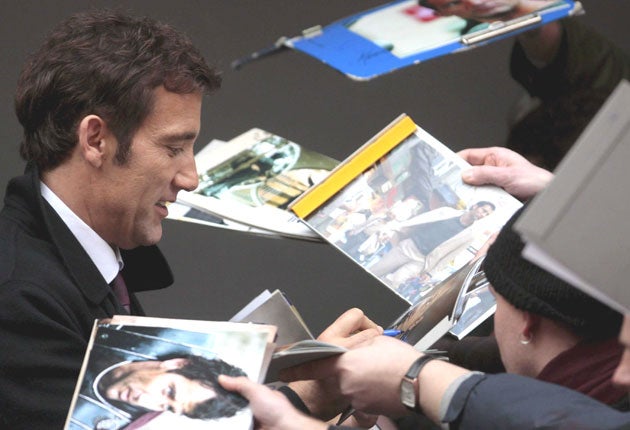At last, cinema discovers a new baddie – the banker
Credit crunch movies take centre stage at the Berlin Film Festival

Your support helps us to tell the story
From reproductive rights to climate change to Big Tech, The Independent is on the ground when the story is developing. Whether it's investigating the financials of Elon Musk's pro-Trump PAC or producing our latest documentary, 'The A Word', which shines a light on the American women fighting for reproductive rights, we know how important it is to parse out the facts from the messaging.
At such a critical moment in US history, we need reporters on the ground. Your donation allows us to keep sending journalists to speak to both sides of the story.
The Independent is trusted by Americans across the entire political spectrum. And unlike many other quality news outlets, we choose not to lock Americans out of our reporting and analysis with paywalls. We believe quality journalism should be available to everyone, paid for by those who can afford it.
Your support makes all the difference.In the shadow of the credit crunch but still able to roll out the red carpet, Berlin launched its 59th international film festival last night with a battery of new productions dealing with economic crisis and the villains responsible for it.
The German director singled out for catching the current global mood most effectively was Tom Tykwer, known for his bank robbery movie Run Lola Run. His new thriller The International premiered yesterday, although the production was shown outside the competition.
Tykwer's film is set in the murky world of international banking. Drawing its inspiration from the collapse of the scandal-wracked Bank of Credit and Commerce International in the early 1990s, it revolves around a bank that doubles as a criminal organisation which does not baulk at murder to achieve its financial ambitions. Clive Owen and Naomi Watts play law enforcement officials investigating the corrupt institution.
"The film has acquired a relevancy all of its own," the director said. "The subject of the film is a system and a principle on which our form of society... has been built, that was generated by a certain kind of idea about the exchange of goods and which we are now beginning to question."
Clint Eastwood's Gran Torino is equally credit-crunch oriented. Set in Detroit, it has Eastwood playing a retired Ford worker watching helplessly as his neighbourhood falls into near-terminal decline. Eastwood's character responds with a spirited crusade against the invasion of his patch by criminal gangs.
Other festival films tackle the subject rather differently. Michael Winterbottom's documentary The Shock Doctrine bases itself on the best-selling work by the globalisation critic Naomi Klein. It attempts to expose the way in which Western governments and businesses profit from war and disaster in the developing world.
In The Wondrous World of Laundry, the German director Hans-Christian Schmidt offers a novel approach with a documentary about what happens to luxury Berlin hotel towels and sheets when they are dispatched for cleaning at a cut-price laundry in Poland. In Eden is West, the celebrated Greek director Constantin Costa-Gavras follows an immigrant in search of jobs in Europe.
The Berlinale rates as the world's most important film festival after Cannes. Werner Schultz, from Germany's Green Party, has been credited with capturing the likely mood at this year's festival with his remark: "Nowadays people are more frightened of their financial advisers than of al-Qa'ida."
Analysts say that the economic crisis may boost the industry by providing cinema-goers with an "escape from reality".
Join our commenting forum
Join thought-provoking conversations, follow other Independent readers and see their replies
Comments